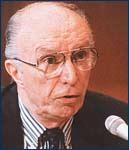 Tom Donahue, secretary-treasurer of the national AFL-CIO from 1979 to 1995 and president in 1995, was a persuasive champion of the need for labor renewal in the face of a changing economic and political environment. Many of the programs he initiated continue to inspire and inform today's innovations in organizing and workplace representation.
Tom Donahue, secretary-treasurer of the national AFL-CIO from 1979 to 1995 and president in 1995, was a persuasive champion of the need for labor renewal in the face of a changing economic and political environment. Many of the programs he initiated continue to inspire and inform today's innovations in organizing and workplace representation.
Donahue grew up in an Irish Catholic family in The Bronx, New York, the son of Thomas R. and Mary E. Donahue. After completing his elementary and secondary schooling, he joined the U.S. Navy at the age of 17, serving as a seaman from 1945–1946. Upon his return to shore, Donahue worked as a part-time organizer with the Retail Clerks International Union and attended Manhattan College, earning his Bachelor of Arts degree in labor relations in 1949.
Shortly after receiving his degree, Donahue was named the director of education for Local 32B of the Building Service Employees International Union (BSEIU) in New York City. He served there as director of education from 1949 to 1952 and from 1952 to 1957 as director of the contract department. During this period, Donahue also attended evening classes at the Fordham School of Law, from which he received the LL.B. degree in 1956.
In 1957, Donahue became the European labor program coordinator for Radio Free Europe and the Free Europe Committee in Paris. He returned to the United States in 1960 and joined the staff of the national office of the BSEIU in Washington, D.C., as the executive assistant to David Sullivan, the newly elected president of the national union, for whom Donahue had worked at Local 32B.
In 1967, President Lyndon Johnson appointed Donahue the assistant secretary of labor for labor-management relations. At the end of Johnson’s term, in 1969, Donahue returned to his post as executive assistant to the president of what, since 1967, had been renamed the Service Employees International Union (SEIU).
In 1971, Donahue was elected first vice president of the SEIU, to serve a one-year term, and in 1972 was re-elected to a full four-year term. Then in 1973, Donahue became executive assistant to AFL-CIO President George Meany and, after Meany’s retirement in 1979, was elected secretary-treasurer of the AFL-CIO, a position he held for 16 years.
As secretary-treasurer, Donahue led the labor movement’s efforts to develop institutional responses that would ensure its continued strength in its changing economic and political circumstances. In 1982, the AFL-CIO Executive Council formed the Committee on the Evolution of Work with Donahue as its chair. Over the next dozen years, the committee brought together labor’s top leaders and advisers to think strategically about labor’s future. Its 1983 report, The Future of Work, analyzed changing employment patterns and the effects of technology. In 1985, the committee issued its report on The Changing Situation of Workers and Their Unions, which was widely viewed as a blueprint for increasing labor’s influence and identified a number of promising strategic and tactical innovations and encouraged unions to experiment with new approaches.
Under Donahue’s leadership, the AFL-CIO launched a number of initiatives inspired by the report, including the recruitment of “associate members,” new financial services for union members and new resources and administrative structures for organizing. In 1994, the committee released a third report, The New American Workplace: A Labor Perspective, A Call for Partnership, which laid out labor’s response to work reorganization and joint labor-management partnerships.
In 1995, after Lane Kirkland retired as president of the AFL-CIO, the Executive Council selected Donahue to serve out the remaining months of Kirkland’s term. Subsequently, at the AFL-CIO convention later that year, in the first contested election for leadership in the organization’s history, Donahue lost the presidency to John J. Sweeney, then president of the SEIU. It was a close, hard-fought campaign. Donahue was supported by a majority of the unions voting, but Sweeney and his “New Voices” slate, with the weighted votes of the larger unions, won a majority of the votes cast. Always encouraging open debate about the federation’s policies, Donahue did much, even in defeat, to re-energize the movement to which he had devoted his life.
In 2001, the Board of Trustees of the George Meany Center–the National Labor College awarded President Emeritus Donahue an Honorary Doctor of Humane Letters degree in labor studies. The board recognized Donahue for his leadership in establishing the George Meany Center and his commitment to the education of union members and workers throughout the world.

